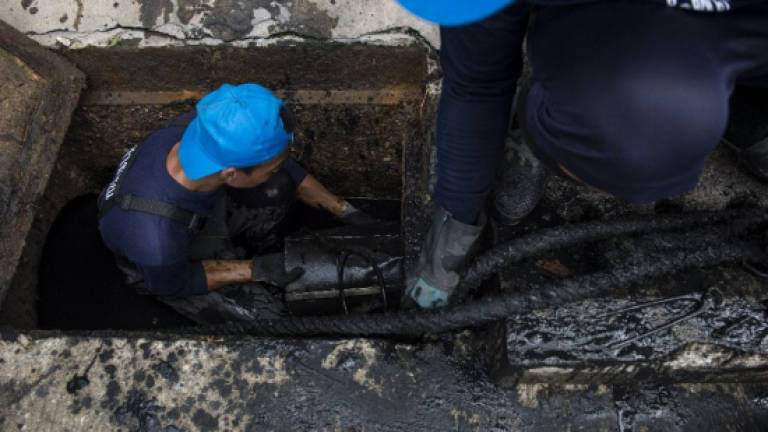Flood threat as plastic bags clog Bangkok's bowels

BANGKOK: A line of prisoners emerges from Bangkok's sewers covered in a thick film of slime and hauling buckets of sludge — frontline troops in the battle against a rising tide of plastic waste.
Located just 50cm above sea level and criss-crossed with canals, Thailand's throbbing capital has long had to fight off floods and an encroaching sea.
But the city's insatiable appetite for plastic bags, combined with a poor track record of recycling, is severely hampering those efforts, especially during the monsoon months.
Plastic has become a major scourge for the city's network of pumping stations, clogging vital machinery during the seasonal downpours and regularly turning major thoroughfares into muddy rivers.
Every day city workers descend into Bangkok's bowels to try and clear some of the debris, supported by convicts who earn time off their jail sentences by volunteering for the task.
On a side street some thirty prisoners dressed in waders and matching blue t-shirts begin their work.
They lift a large concrete slab leading to the a drainage channel below, scattering an army of cockroaches.
Sliding into the filthy water, the group uses metal buckets to scrape away at the slime-covered debris blocking the drainage pipes.
"The work is not too difficult," said one prisoner who puts in six days a week on volunteer duty. "And it allows me to go home more quickly."
Each day the prisoners work is a day lifted from their sentence. Thailand's corrections authorities asked AFP not to identify any prisoners in return for access to their work programme.
Whither sufficiency?
Throughout his long reign, Thailand's ailing but revered King Bhumibol Adulyadej, 88, preached a concept he dubbed the "sufficiency economy" — a philosophy that espoused sustainability, environmentalism and making do with what one has.
But there are times when Bangkok — home a huge chunk of the country's moneyed elite and middle classes — seems like it has gone in the opposite direction.
All across the sprawling city of some 12 million inhabitants vast shopping malls and condo blocks with swimming pools suck up huge amounts of electricity while an ever growing number of SUVs hog the streets.
Thailand is widely considered to be one of the world's largest consumers of plastic bags.
The government's own figures suggest the average Thai uses eight plastic bags a day — in contrast, the average person in France uses around 80 a year.
The nation has a thriving street food culture with millions eating or buying their meals on the pavement each day. There once was a time when most of these dishes would be served wrapped in biodegradable banana leaves. But no longer.
It is a shift familiar across the region, with devastating results for the world's oceans.
In a recent report, an American conservation group Ocean Conservancy estimated that just five countries — China, Indonesia, Philippines, Vietnam and Thailand — were responsible for as much as 60% of plastic waste dumped into the ocean.
Narong Ruengsri, head of Bangkok city authority's drainage department, said removing so much plastic from the canals and drainage system is a constant battle.
"Every day we go fish out around 2,000 tons of waste from the drainage channels," he told AFP.
'Live on a hill '
Unless there is a major change in consumer habits, or a concerted government campaign to reduce bag use, the waste will continue to pile up.
Official figures show the 11,500 tonnes of garbage Bangkok produces each day — at least one tonne of which is plastic — is growing by 10% a year.
Officially only 16% is recycled — although non-government artisan recyclers would boost that figure.
Wijarn Simachaya, director of pollution control at the Ministry of Environment, conceded Thais needed to change their habits.
"We are one of the worst performers in the world in terms of marine debris." he said.
But local environmental activist Srisuwan Janya said the government needed to take a stronger lead.
"In Thailand companies have done more in this area than the state has," he said.
Gaffes by Bangkok's governor Sukhumbhand Paribatra have not helped perceptions that Thai officials could do more.
Last year, after a particularly bad bout of monsoon flooding, he sparked uproar by suggesting residents who wanted to avoid inundations should "live on a hill". — AFP